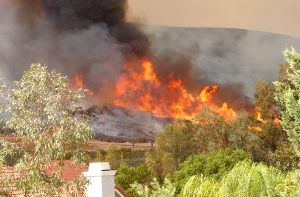
After more than 8.5 million acres had burned in 48,850 wildfires through September, U.S. Reps. Greg Walden (R-OR) and John Shimkus (R-IL) led a congressional panel in reviewing the toll wildfires have taken on air quality in affected areas.
Walden, the chairman of the House Energy and Commerce Committee, and Shimkus, the chairman of the Subcommittee on Environment, also led members in reviewing ways to mitigate the impact of wildfires through forestry management tools like prescribed burns and fuel reduction.
Also on Wednesday, lawmakers welcomed news that the Office of Management and Budget (OMB) included $576.5 million in supplemental wildfire funding in a budget request to Congress, as well as recommending forest management reforms.
“Just this summer in my home state of Oregon, we watched as fires burned more than 678,000 acres — equivalent to two-thirds the size of Rhode Island — and over $340 million has been spent — so far — to fight them,” Walden said. “Across Oregon, schools were forced to close because of smoke and poor air quality. Communities have watched timber jobs disappear as more and more of our federal land has become locked up. Those same communities are now watching tourism dollars slip away as visitors stay away from the smoke.”
By September, the total land area burned in 2017 wildfires had already exceeded the 10-year annual average by 3 million acres. In addition to causing eye and respiratory irritation, impaired functioning of the lungs, bronchitis and asthma, wildfire smoke emits carbon dioxide and particulate matter that exceed national ambient air quality standards, according to a committee report.
“The statistics are staggering,” Shimkus said. “So far this year, there have been almost 49,000 wildfires in the United States destroying nearly 8.5 million acres. And the emissions from these fires can have serious impacts on air quality over a range that can stretch for many miles. As a result, millions of Americans can be exposed to the pollutants found in wildfire smoke, sometimes for extended periods of time. Congress should be looking at any and all ways to address wildfires and their air emissions, and most important of all, the policy measure that can help prevent or minimize wildfires in the first place.”
John Bailey, a professor at Oregon State University’s College of Forestry, testified that more aggressive tactics on firelines and more expensive firefighting technologies are not effective solutions to minimize wildfires.
“The solution is to harness the expertise and dedication of federal, state, tribal, (non-governmental organizations) and private sector fire managers to use active and sustainable forest management today, including fire as one of the tools, to help mitigate the effects of future fires,” Bailey said.
Walden has had talks with the Trump administration in recent weeks to discuss the severity of the fire season in Oregon and other Western states. The OMB’s supplemental request said that forest management reform must be included in any long-term solution to prevent wildfires.
“I want to thank the Trump administration for their request for funds to cover the costs of this fire season, as well as their call for Congress to reform our broken federal forest policy that hinders them from implementing much needed forest management,” Walden said.
Walden had previously led a letter calling on the OMB to treat wildfires like other natural disasters.
“Another fire season winds down and, once again, the Forest Service needed to rob money from important fire prevention work to pay for fighting wildfires. We must not only supplement those accounts to pay for the cost of this fire season, but it’s past time that we fix how we pay for fires and treat them like the natural disasters they are.”
Federal forest policy must also be streamlined, Walden concluded, so that forest managers can complete fire prevention work that reduces the risk of catastrophic fires that “choke our skies and communities with smoke.”



